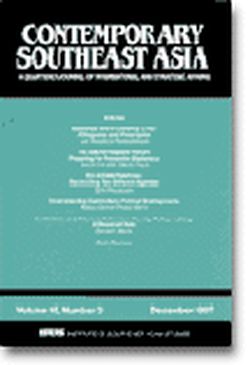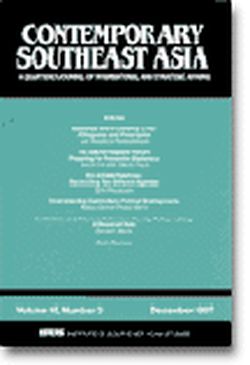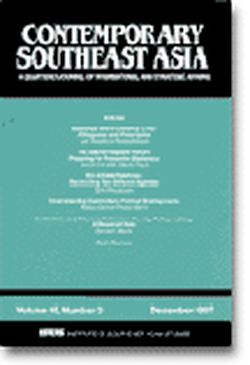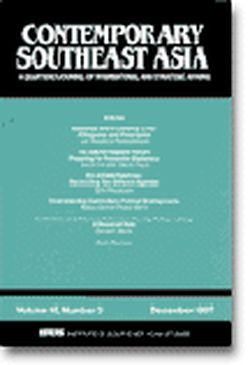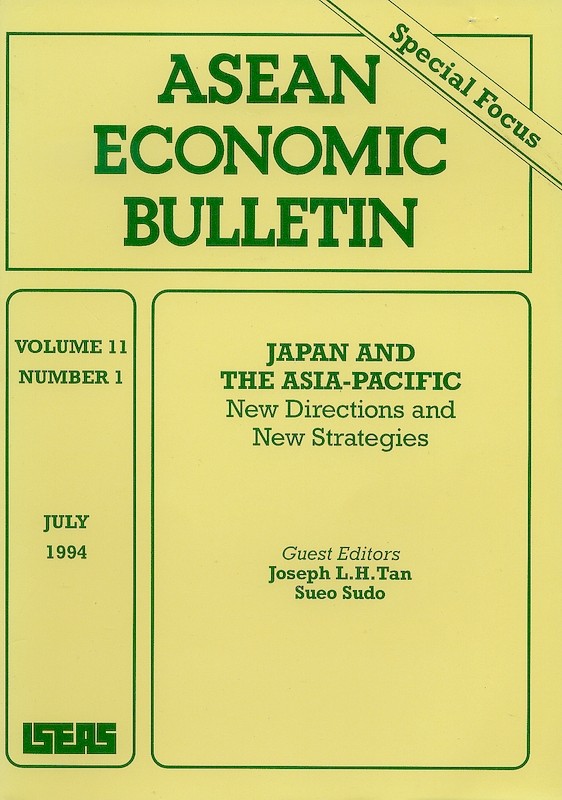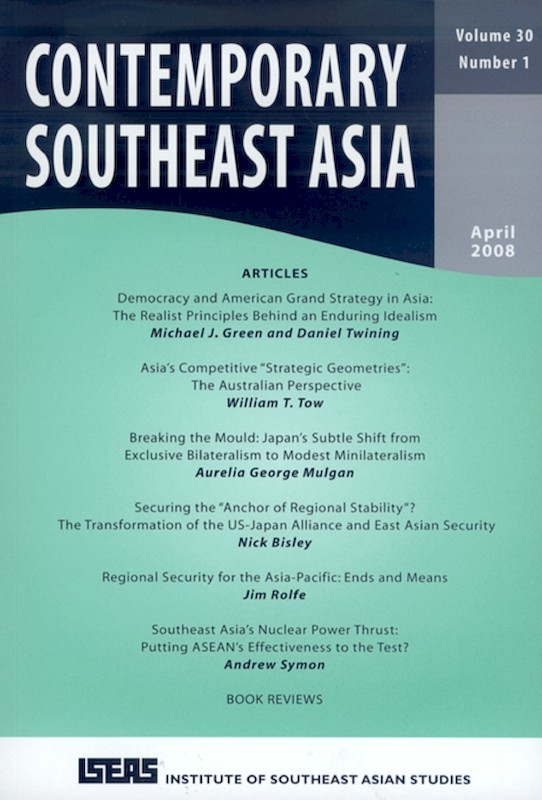Contemporary Southeast Asia: A Journal of International and Strategic Affairs Vol. 12/3 (Dec 1990)
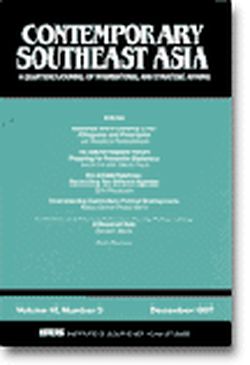
Date of publication:
December 1990
Number of pages:
105
Code:
CS12/3
Contents
-
Preliminary pages
-
Introduction
- ARTICLES
-
Some Thoughts on ASEAN Security Co-Operation: An Indonesian Perspective, by Mochtar Kusuma Atmadja, author see abstractThe likelihood of a significant reduction of the current U.S. military presence in the Asian-Pacific region and the eventuality of a settlement of the long drawn-out Kampuchea question has triggered a rethinking of the state of relations among the countries in Southeast Asia. One central concern has been in the area of regional security co-operation, an almost-proscribed issue among the ASEAN governments. This article proposes the formation of a three-power defense arrangement among Malaysia, Singapore and Indonesia - an initial stage leading to the institutionalization of defence and security co-operation within ASEAN, the replacement of extra-regional security arrangements and a first step towards the realization of ZOPFAN. The proposal advances the concept of a three-nation security framework that will in the end enhance regional self-reliance and political stability.
-
A Study of the Khmer People's National Liberation Front and the Coalition Government of Democratic Kampuchea, by Abdulgaffar Peang-Meth, author see abstractThis article is an interpretation of the history and role of one of the principal, albeit less well-known, players of the Coalition Government of Democratic Kampuchea - the Son Sann-led Khmer People's National Liberation Front (KPNLF). It describes the initial formation of the movement and provides insights into its relationship with its coalition partners, the communist Khmer Rouge, and the Sihanoukists. At a time when a political solution to the Kampuchean problem still appears unlikely, it is argued that the KPNLF represents a viable option for a non-communist, democratic Kampuchea.
-
Japan's Security Policy and Southeast Asia, by Reinhard Drifte, author see abstractDespite changes in the bipolar structure since 1973 and particularly since November 1989, Japan's predominantly bipolar foreign policy and security outlook has not changed much because detente has less effects in a region with a more diffused power constellation and considerable potential for regional instabilities. Japan's economic priorities and alliance with the United States has compelled Tokyo to pursue regionalist policies in order to maintain its bilateralist policy with the United States. But Japan's security interests in Southeast Asia are considerable because of its investments in the region which have to be protected. This is the factor which will increasingly shape Japan's security policy and perception of security towards the region. Although aid with creeping political overtones is Japan's maJor instrument in protecting its interests in the region, the country is likely to take over more military regional roles from the United States, including possibly personnel involvement in peace-keeping operations such as those in the Gulf or those planned for Kampuchea.
-
China and Japan in ASEAN's Strategic Perceptions, by Julius Caesar Parrenas, author see abstractThe search for common approaches to problems facing the region has become especially cruciaJ at a time when the Kampuchean question will soon cease to become a maJor rallying point for the ASEAN member countries. This article argues that collective approaches towards the region's relations with China and Japan can be developed. Finding parallel perceptions towards the two extra-regional powers within the community, it contends that these common interests are important in maintaining ASEAN unity and preventing intervention by the extra-regional powers. By specifically identifying interdependent linkages in their individual security concerns, a woricable frameworic responsive to the changing international environment can be pursued by the regional organization.
-
Indonesia's Relations with China and Japan: Images, Perception and Realities, by Dewi Fortuna Anwar, author see abstractThis article focuses on Indonesian perceptions of its relations with China and Japan and describes the development of Indonesian foreign policy from the time of its independence, during the Guided Democracy period under Soelcarno, to the New Order government under Soeharto. It attempts to define Jakarta's conception of national and regional resilience as the foundation of Indonesian foreign policy in order to enhance regional order on the basis of political stability and economic development. The study of the conduct of Indonesia's foreign relations with the two countries is Juxtaposed with Jakarta's pursuit of a non-aligned and independent external policy. In particular, it provides insights into the development of Sino-indonesian relations prior to the recent normalization of ties between the two countries.
-
Thai Perceptions of China and Japan, by Surachai Sirikrai, author see abstractForeign policy action results from the state's responses to the various factors and conditions beyond its territorial boundaries. Such responses are often based on the policy-maker's perceptions of changes in the international milieu. Thai policy towards its neighbouring states is viewed here as responses to the political, strategic and economic shifts in its salient environment. This article reflects on the evolution of Thai foreign policy. Specifically, the author looks at changing Thai perceptions and policy towards two major powers in Asia, China and Japan. The subject is discussed within the context of developments in Indochina, and the potential collaborative efforts of the three countries in addressing problems facing the peninsular states.

